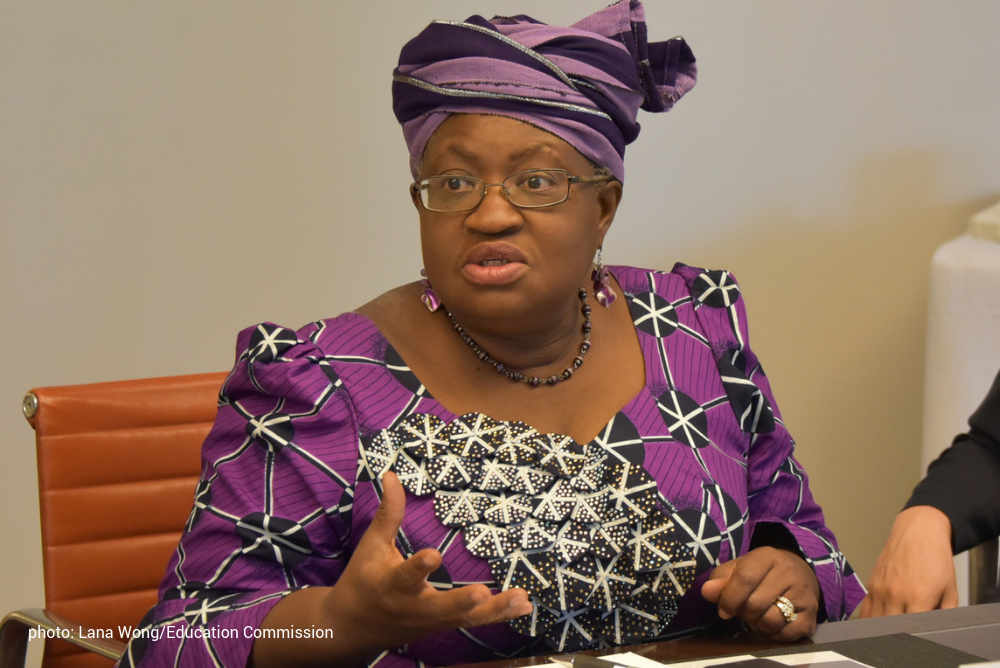This opinion editorial was written by former Finance Minister of Nigeria Ngozi Okonjo-Iweala and originally appeared in German in Frankfurter Rundschau.
For decades, Germany has been a leader in improving health and combating poverty in Africa, Asia, and beyond. Thanks to its financing expertise, Germany helped shape the Global Fund to Fight Aids, Tuberculosis and Malaria and Gavi, the Vaccine Alliance – both of which have channeled billions of dollars into healthcare and saved millions of lives.
Healthy bodies need healthy minds, so complementary investments in education can help maximize the benefits of health investments and safeguard our children’s health. There are countless other additional benefits, as education is central not only to improving public health but also economic growth, reducing inequalities, strengthening safety and security, combating climate change, and creating opportunities to help stem migration.
A recent World Bank report suggests that universal girls’ education and the social capital it would create could save the world up to US$30 trillion in lost wealth. An investment in education – especially for girls – is an investment in a brighter, more stable future.
Now is the time for Germany to apply its financial expertise and experience in skills and vocational training to tackle the most pressing crisis of our time: the global learning crisis. More than 260 million children and young people are not in school. Millions more will drop out early due to the poor quality of their education. The problem is so severe that if current trends persist, by 2030 more than half of the world’s children and young people – 825 million – will not have the basic skills needed for the modern workforce.
Countries must bear primary responsibility for the financing and reform of their education systems, but many places where strong efforts are being made – especially lower-middle-income countries – do not have adequate domestic resources and need help to fully fund their education progress. The international community, including Germany, should consider providing that help to solve problems in a way that can be self-sustaining.
However, even the most optimistic projections of expanding grant-based aid will not fill the glaring funding gap between the needs of developing countries and the realities of their domestic resources. We need a breakthrough solution to unleash new streams of affordable funding for countries committed to reform and investing in their future.
For several years, I’ve been working with colleagues from government, civil society, and the private sector to come up with a solution. Our big idea is to create the International Finance Facility for Education.
The Facility could enable 200 million more children to go to school, and help end child migration, trafficking, marriage, and labor by supporting free universal education across developing countries. When established, the Facility will be the biggest single educational investment in history. The United Nations Secretary-General first introduced the Facility to Germany and other donor countries at last year’s G20 meetings in Hamburg, where it was acknowledged in their communique.
The Facility multiplies donor dollars for much greater impact. By leveraging a combination of guarantees and grants it could generate an additional €8.5 billion annually starting in 2020 for quality education around the world. Countries committed to domestic investment and reform would benefit, particularly lower-middle-income countries. Now home to half of the world’s schoolchildren, these countries need support to continue their education efforts while they are able to assume full financial responsibility for their education systems. To start, the Facility needs sufficient – roughly €1.7 billion – donor guarantees.
In 2017, Germany provided €21 billion in total development assistance, more than any other donor except the United States. Now, Germany and other donors can lead the way and make the International Finance Facility for Education a reality and foster a new generation equipped with the skills to thrive.
Ngozi Okonjo-Iweala is a member of the Education Commission, former Finance Minister of Nigeria, and former Managing Director of the World Bank.


Press more on the quality of education our children could receive.
Developing Nations then should be supervised judiciously in their utilization of resources graciously offered by well meaning countries to aid educational development.
jebesoin de votre aide